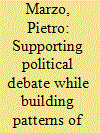| Srl | Item |
| 1 |
ID:
174081


|
|
|
|
|
| Summary/Abstract |
Building on empirical qualitative material, this article argues that the international promotion of democracy is crucial to account for Tunisia’s positive transitional outcome. Specifically, the study sheds new light on the capacity of international democracy promoters (IDPs) to enhance competitive politics and contribute to the professionalization of political parties and civil society groups during Tunisia’s post-revolutionary path. The article also offers two research avenues for reviewing the negative standing on international democratic promotion in the MENA region. First it argues that promotion of democracy in transitions away from authoritarianism is more likely to succeed when a wide spectrum of transitional elites agrees upon the political system to establish and they do not enter into conflicts on how to collaborate with the IDPs. Second, it emphasizes that during a transitional period, structured and strategic partnerships between IDPs and transitional elites enable fragile societies to sustain their democratic process if internal and external anti-systemic interventions do not place obstacles in the path of this interplay.
|
|
|
|
|
|
|
|
|
|
|
|
|
|
|
|
| 2 |
ID:
171937


|
|
|
|
|
| Summary/Abstract |
Scholarly consensus postulates a sharp contrast exists between liberal values and realist interests in US foreign policy in the Middle East and North Africa (MENA) region, which finds its expression in the ‘security–democracy’ dilemma. This means the US rhetorical determination to abide by the values of a ‘liberal’ foreign policy is neutralised by the ‘realist’ priority of maintaining US strategic interests, which requires support for friendly authoritarian rulers. Scholarship tends to apply this reasoning indistinctly to the entire region, providing an encompassing framework of analysis for understanding US foreign policy, which is valid across time and space. This study challenges this theoretical assumption and argues that while the US might indeed have a comprehensive regional approach in the MENA, the resulting foreign policy follows country-based trajectories that respond to national specificities and the perceived implications for US strategic interests. Exploring US foreign policy in the MENA after 9/11, the article demonstrates that while the US emphasis on liberalism crumbled when faced with security issues, the US liberal approach to Tunisia unfolded more consistently. Although the US continued formal cooperation with Ben Ali’s regime, it empowered at the same time a coalition of democratic opponents, solving the security–democracy dilemma and positively influencing the Tunisian democratisation.
|
|
|
|
|
|
|
|
|
|
|
|
|
|
|
|
| 3 |
ID:
164908


|
|
|
|
|
| Summary/Abstract |
This article focuses on a specific aspect of the international context surrounding the Tunisian transition to democracy. Through the case of the German political foundations in Tunisia, this study argues that the country’s journey to democracy has not been an exclusively domestic affair, but has also been the product of the engagement of international actors and their interplay with domestic groups. Building on evidence from semi-structured interviews and data triangulation the article shows that since the late 1980s four German political foundations operating in Tunisia created platforms for ‘political debate’ – alternative to the regime’s but not subversive – and encouraged political training. The article posits that initially the German political foundations helped Ben Ali’s regime in the making of a ‘façade liberalisation’, while in the long run their activities generated unintended consequences that in part undermined its ‘authoritarianism upgraded’. The article demonstrates that their longstanding presence on the ground allowed the German political foundations to develop patterns of trust with and between political and civil groups, ultimately improving the capacity of their action after the revolution.
|
|
|
|
|
|
|
|
|
|
|
|
|
|
|
|